Blog Content
5
Jul
2025

A metal chain link fence is a woven steel wire barrier that provides security, durability, and affordability for residential, commercial, and industrial properties. Made from galvanized or vinyl-coated steel wire, these fences offer excellent visibility while creating strong perimeter boundaries.
Quick Facts About Metal Chain Link Fencing:
Chain link fencing is the number one selling fence system in the world according to industry data. It's widely used because it combines low cost with high durability. The galvanized coating protects against rust and corrosion, while the open weave allows airflow and visibility.
This versatile fencing works well for many applications. Homeowners use it for pet containment and property boundaries. Schools install it around playgrounds and sports courts. Industrial facilities rely on it for security perimeters.
The key advantage? Professional installation is straightforward, and the fence requires minimal maintenance once properly installed. Unlike wood fencing that needs staining or vinyl that can crack, chain link just needs occasional cleaning with soap and water.
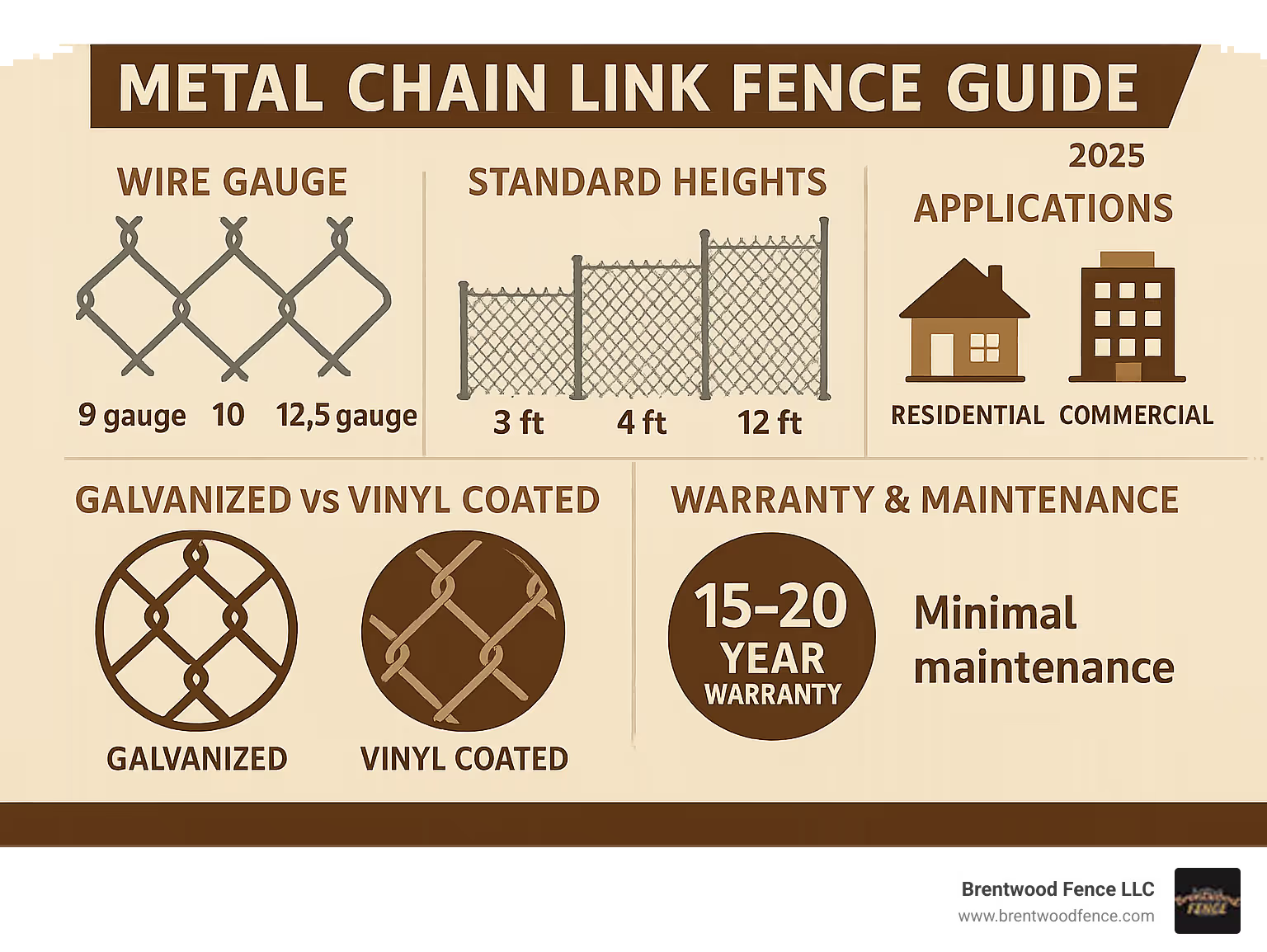
Metal chain link fence terms to learn:
A metal chain link fence is woven steel fabric stretched between sturdy framework posts, creating that familiar diamond-shaped mesh pattern you see everywhere from school playgrounds to industrial sites.
The wire starts as high-quality steel that gets spiraled into coils, then woven together like a giant metal basket. This creates a fence that's both flexible enough to handle wind and weather but strong enough to keep intruders out.
The Chain Link Fence Manufacturers Institute calls chain link "the most economical security fencing solution" - and they're not wrong.
Metal chain link fence comes with two types of finished edges called selvage. Knuckled selvage has smooth, rounded wire ends that won't snag clothing or scratch kids and pets. Twisted selvage leaves wire ends twisted together, creating small points that add security but need careful handling.
Most chain link uses 2-inch mesh sizes and comes in 50-foot rolls ranging from 3 feet to 12 feet tall.
The weaving process gives chain link its strength. Spiraled wire coils get interlocked using specialized machinery that creates the diamond pattern. This isn't just pretty - it's what gives the fence its ability to flex without breaking.
Two main methods exist for applying protective galvanized coating: GAW (Galvanized After Weaving) and GBW (Galvanized Before Weaving). GAW fabric gets its zinc coating after weaving, creating a smoother finish with fewer sharp edges. GBW fabric gets galvanized before weaving, which can save money but might leave slightly rougher edges.
A complete metal chain link fence system includes line posts along straight runs, typically spaced 6 to 8 feet apart. Terminal posts are larger anchors at corners, ends, and gates that get concrete footings.
The top rail runs horizontally along the fence top for support. Tension bars slide through the fence fabric at terminal posts, spreading tension forces evenly.
Brace bands and tension bands hold everything together. Professional installation requires specialized tools like fence stretchers for proper tension, post drivers for exact depths, and come-alongs for controlled tensioning.
Metal chain link fence delivers a winning combination of affordability, practicality, and reliability that's hard to beat.
Cost-effectiveness stands out as the biggest advantage. With material costs ranging from $4 to $15 per linear foot, chain link consistently delivers the best value compared to wood, vinyl, or wrought iron.
Transparency lets you see what's happening on both sides, valuable for sports facilities, playgrounds, and commercial properties where visibility matters for safety and security.
Installation speed means professional crews can complete your fence much faster than other materials, resulting in lower labor costs and less disruption.
Wind resistance makes chain link smart for exposed locations. The open mesh design lets wind pass through instead of turning your fence into a sail.
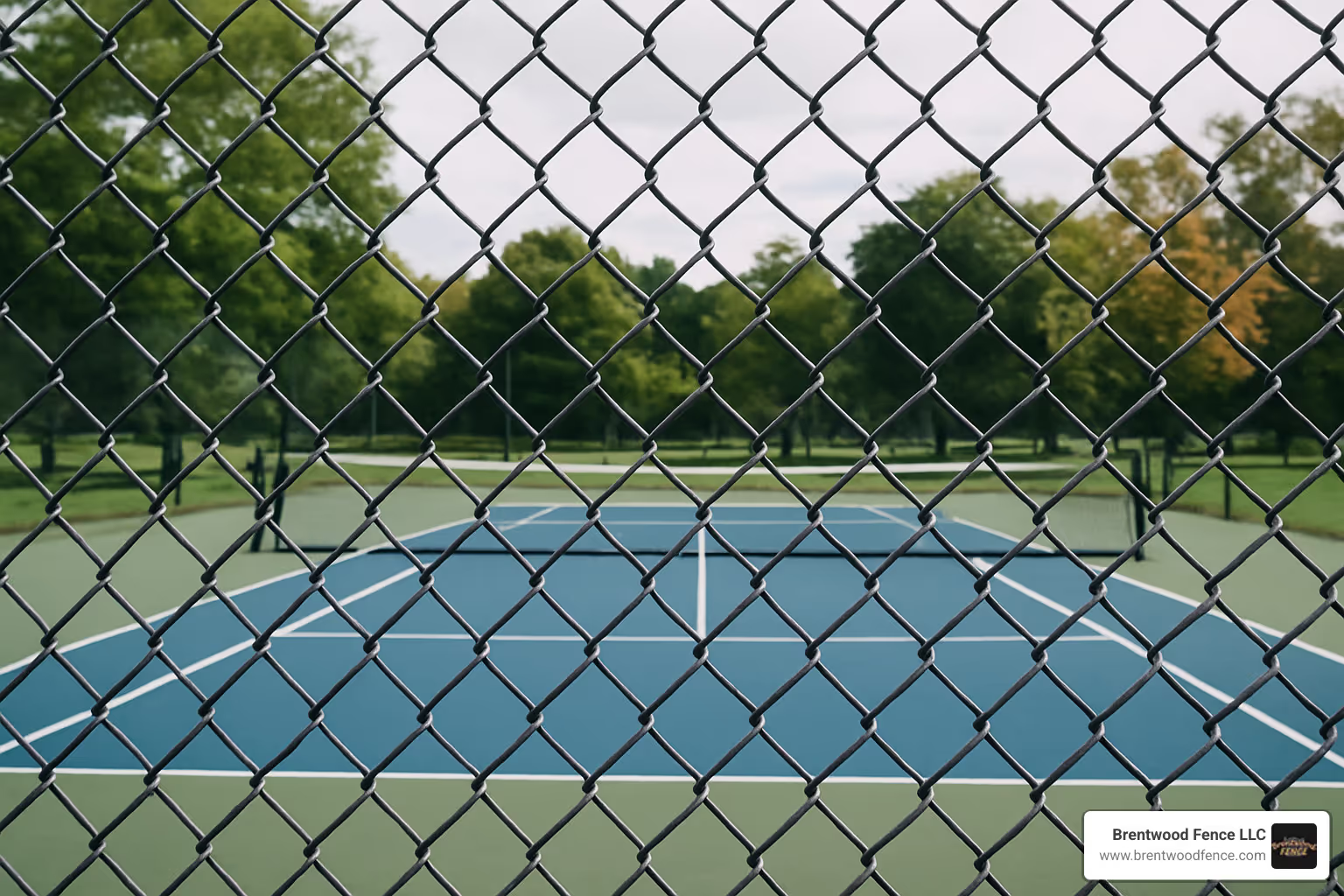
Popular applications include pet containment, where dog owners can keep pets safely enclosed while maintaining visibility. Sports courts rely on chain link to contain balls while letting spectators enjoy clear views. Industrial yards use chain link for perimeter security while maintaining sight lines.
The longevity speaks for itself - most systems come with 15 to 20-year limited warranties. Learn more about our sports court fencing installation services in NH, MA and ME.
Residential applications typically use 11.5 or 12-gauge wire at heights between 3 and 6 feet. Commercial properties step up to 9 or 11-gauge wire with heights from 6 to 10 feet. Industrial installations use the heaviest materials - 6 to 9-gauge wire with heights reaching 12 feet or more.
Security improvements can include barbed wire arms, razor ribbon, and bottom rails for improved protection.
Modern metal chain link fence options include vinyl-coated varieties in black, green, brown, and white. Black vinyl coating is popular for residential use because it's less visually prominent. Green coating helps fences blend with vegetation, while brown coating complements earth-tone buildings.
The vinyl coating provides additional corrosion protection while delivering color options. Powder-coated fittings can match your fence fabric color for a coordinated look.
Choosing the perfect metal chain link fence requires balancing several important factors for a fence that will serve you well for decades.
Start with your local building codes - these requirements can save you from costly mistakes. Most towns have specific rules about fence height, setbacks from property lines, and permits. Many areas require permits for fences over 6 feet tall.
Soil conditions play a bigger role than most people realize. Rocky New England soil makes post installation more challenging, while sandy soil requires deeper concrete footings. Clay soil can create drainage problems.
Wind loads matter, especially near the coast. Chain link's open mesh design lets wind pass through, but you'll still need properly spaced posts and adequate footings.
Here's how chain link compares to other options:
FeatureChain LinkWoodVinylInitial Cost$4-15/ft$15-30/ft$20-40/ftLifespan15-20 years10-15 years20-30 yearsMaintenanceMinimalHighLowPrivacyLow (with slats: High)HighHighInstallation SpeedFastModerateModerate
Wire gauge numbers work backwards - lower numbers mean thicker wire. Nine-gauge wire measures about 0.148 inches thick and handles serious stress. Twelve-and-a-half-gauge wire is only 0.080 inches thick.
Break strength increases dramatically with wire thickness. Heavy-gauge wire costs only slightly more but provides much better protection against impacts, weather, and wear.
Height selection affects both security and appearance. Four feet works for pet containment, six feet provides solid residential security, and eight feet or higher sends a serious security message.
Galvanized coating protects steel wire with zinc that corrodes first, sacrificing itself to protect the steel underneath. Standard galvanized provides excellent protection in most environments at lower cost.
Vinyl-coated chain link adds a polymer layer over galvanized wire for double protection. This combination provides superior corrosion resistance, especially in harsh environments, plus attractive color options.
Coastal projects particularly benefit from vinyl coating's extra protection against salt air acceleration of corrosion.
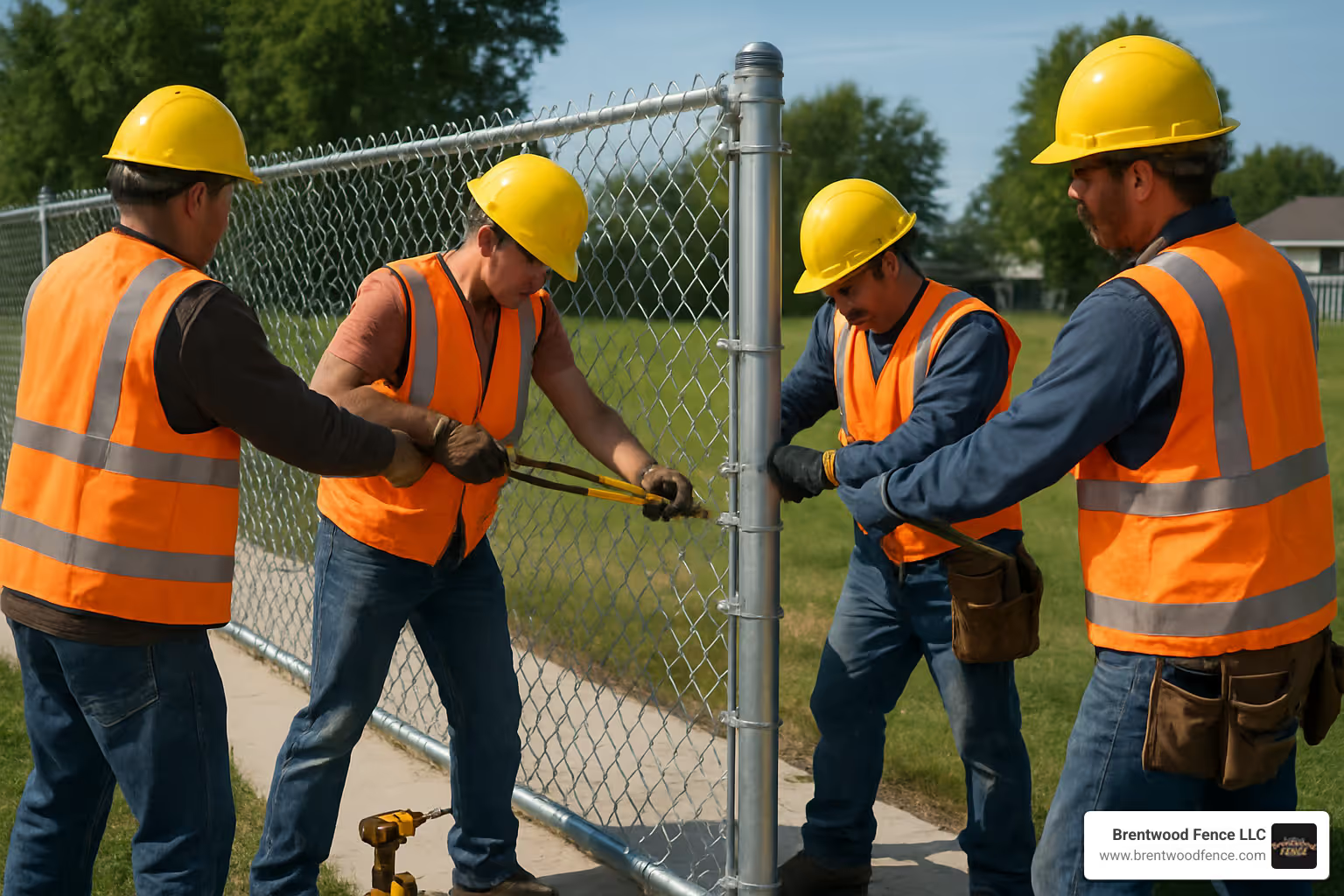
Professional installation makes the difference between a fence that lasts decades and one that starts sagging within years. The process starts with site layout and surveying to establish exact fence placement and spot potential problems early.
Permit requirements vary by location. Most areas require permits for fences over 6 feet tall or any fence in front yards. The permit process usually takes one to two weeks and costs between $50 and $200.
Utility marking is critical before digging. We coordinate with Dig Safe services to identify underground utilities, requiring 48 to 72 hours notice.
Concrete footings provide the foundation for terminal posts and gates. Concrete needs 24 to 48 hours to cure properly before tensioning fence fabric.
For complete details, check our Chain Link Fencing Installation Services throughout New Hampshire, Massachusetts, and Maine.
Professional installation requires specialized tools including come-alongs for controlled tensioning, fence pliers designed specifically for fence work, and tensioning tools for uniform fabric tension.
The proven sequence starts by setting terminal posts at corners, ends, and gates with concrete footings. Adding braces provides stability during installation. Running the top rail connects posts and supports fence fabric.
Stretching and tensioning the fabric requires calibrated equipment to achieve manufacturer specifications. Gate installation requires precise measurements and alignment for proper operation.
Final inspection verifies everything meets specifications and local codes before job completion.
Your metal chain link fence can be improved to meet specific privacy and security needs.
Privacy slats are the most popular residential upgrade. These vertical strips slide into mesh openings, creating an attractive barrier that blocks views. Vinyl versions resist fading, while aluminum offers durability in harsh weather.
Privacy screens offer faster installation with large fabric or vinyl panels that attach with clips, covering significant sections quickly.
For security upgrades, barbed wire arms extend fence effectiveness with angled extensions holding three strands of barbed wire. Razor ribbon provides ultimate climbing deterrence for high-security facilities.
Truss rod installations provide structural support for tall fences or high-wind installations. Bottom rails prevent lifting the fabric and add structural stability.
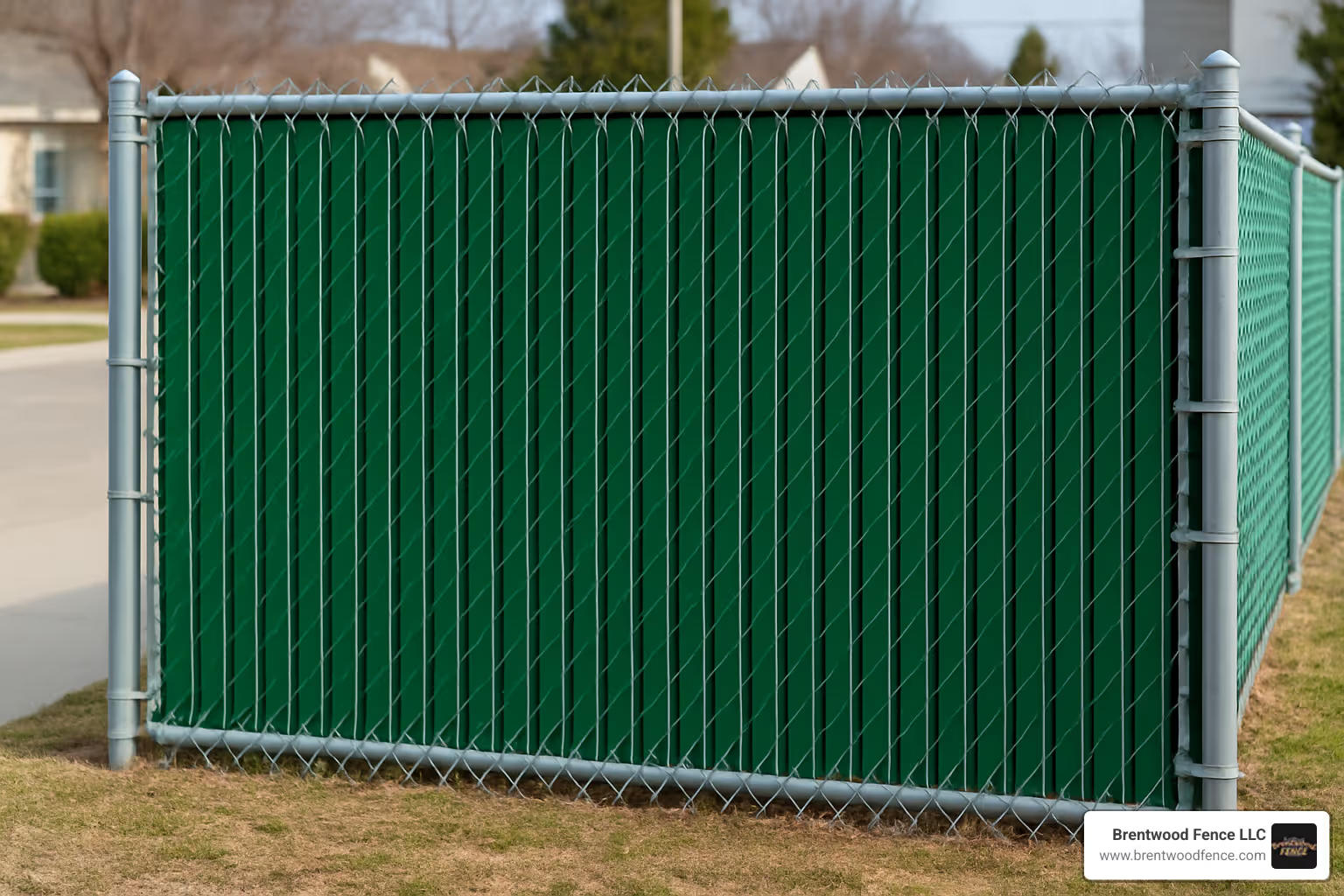
Keeping your fence functioning properly requires minimal but consistent effort. Annual washing with soap and water removes salt, dirt, and grime. Tie wire inspection should be part of yearly routine to check for loose spots.
Hardware tightening keeps gates and latches working smoothly. Vinyl coating touch-ups protect against corrosion when small chips appear. Snow removal during New England winters prevents damage from heavy, wet snow accumulation.
When budgeting for a metal chain link fence, you'll find material costs ranging from $4 to $15 per linear foot. The price depends on what you need - basic residential fencing with lighter gauge wire costs less, while heavy-duty commercial or industrial specifications push costs higher. These prices cover everything: fabric, posts, and the essential hardware that holds it all together.
Labor adds another $7 to $20 per linear foot to your total investment. The final cost depends on your specific situation. Got rocky soil that fights back against every post hole? That'll cost more. Need a fence that zigzags around obstacles or includes multiple gates? Expect higher labor charges. Simple, straight installations are the most budget-friendly option.
Don't forget about permits, which typically run $50 to $200 for residential projects. Some areas get picky about tall fences or installations in high-wind zones, requiring engineered drawings that add to costs. The good news? We handle the permit paperwork for our customers, so you don't have to steer municipal offices.
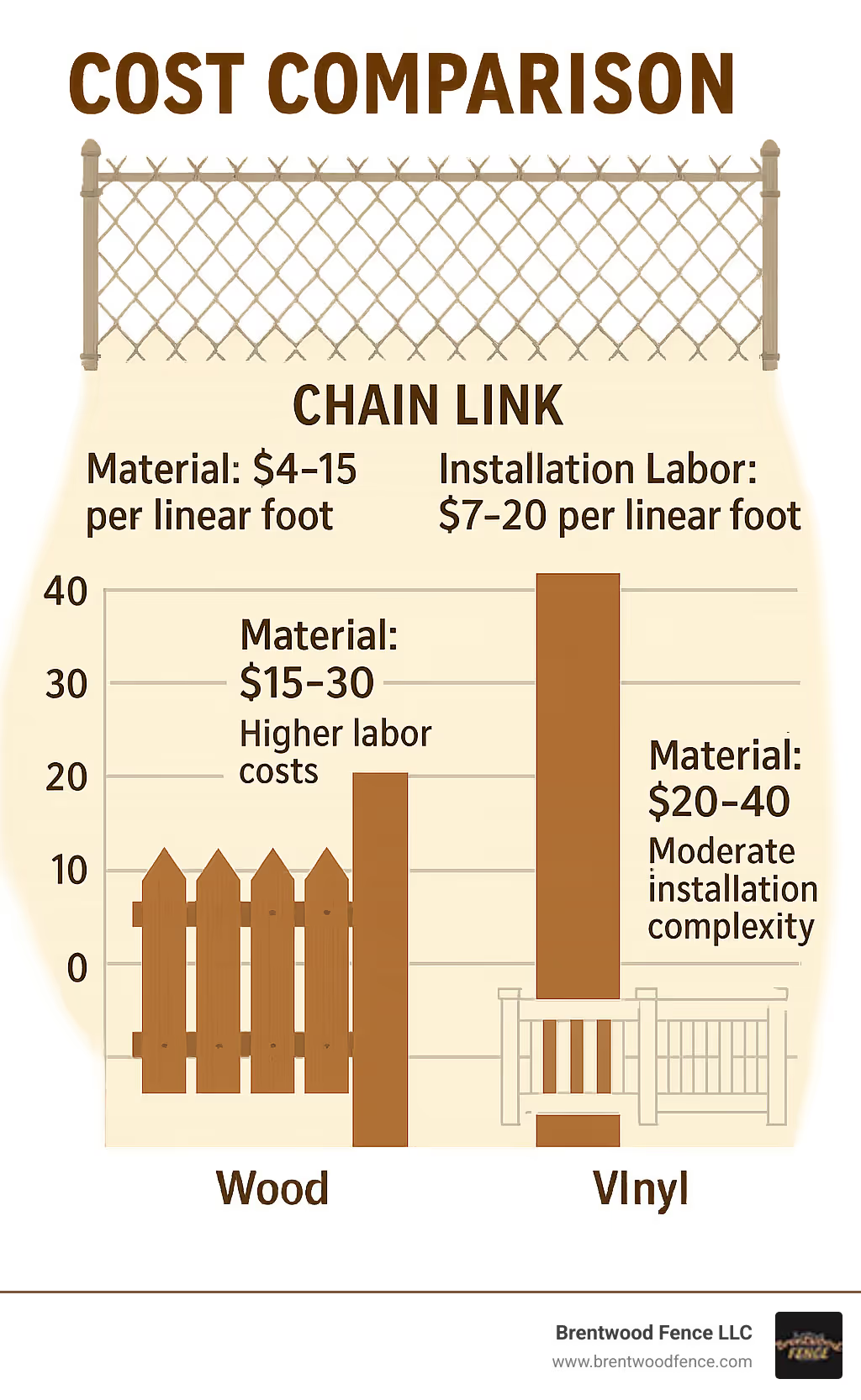
HOA rules can throw a curveball into your fencing plans. Many residential developments have strict guidelines about fence types, heights, and colors. Some associations even require approval from an architectural review committee before you can start your project. We always recommend checking these rules early in the planning process - it's much easier than changing everything later.
Corner lot properties face extra challenges with setback requirements. Municipalities often require greater distances from street corners to keep sight lines clear for traffic safety. These rules can affect where you can place your fence and how tall it can be.
Comparing chain link versus wrought iron reveals dramatic budget differences. While wrought iron looks stunning, it costs three to four times more than comparable chain link installations. For property owners focused on security and value, chain link delivers better bang for your buck.
Here's an interesting detail: Which side of a chain link fence is supposed to be at the top? The smooth knuckled edge should face upward for safety, while the twisted edge faces down to deter climbing. It's one of those details that professional installers handle correctly every time.
The bottom line? Metal chain link fence offers the most economical path to secure perimeter protection. When you factor in the 15-20 year lifespan and minimal maintenance requirements, the long-term value becomes even more compelling.
The wire gauge system works backwards - lower numbers mean thicker, stronger wire. 9-gauge wire is much stronger than 12.5-gauge wire, handling over 1,200 pounds of force versus 600 pounds.
Upgrading to heavier gauge typically adds only $1-3 per linear foot but provides nearly double the strength. For most homeowners, 11.5-gauge works fine, but if security is a priority, 9-gauge wire is a smart investment.
Absolutely! Privacy slats are the most popular choice - vertical strips that slide into existing mesh. They come in different colors and cost around $3-8 per linear foot professionally installed.
Privacy screens offer quicker installation with fabric panels that clip onto existing fence, costing about $2-5 per linear foot. Natural privacy through landscaping creates beautiful, living privacy that adds property value.
Local zoning ordinances set rules for fence heights and setbacks. Most residential areas allow 6-foot fences in back yards but limit front yards to 3-4 feet. Corner lots often face stricter rules for traffic sight lines.
Building codes specify technical requirements like post hole depths and concrete specifications. HOA rules can be stricter than city codes, often requiring approval before installation. Utility easements can restrict fence placement even on your own property.
We recommend professional property line surveys before installation to prevent boundary disputes.
Choosing a metal chain link fence is a smart investment that delivers excellent value for years to come. With material costs starting at just $4 per linear foot and a 15-20 year lifespan, chain link provides the best value compared to alternatives requiring frequent maintenance or replacement.
Professional installation makes all the difference in performance and longevity. The specialized tools, proper tensioning techniques, and code compliance knowledge that experienced contractors provide simply can't be replicated with DIY approaches.
Here in New England, we understand unique climate challenges. Heavy snow loads, coastal salt air, and temperature swings all affect fence performance. At Brentwood Fence LLC, we've been helping customers throughout New Hampshire, Massachusetts, and Maine steer these challenges for years.
Whether you need pet containment, commercial security, or industrial boundaries, metal chain link fence offers the perfect combination of affordability, durability, and effectiveness. From 3-foot residential applications to 12-foot high-security installations, there's a chain link solution for virtually every need.
Ready to move forward? We're here to help you select the right specifications, handle permits, and ensure professional installation that meets all local codes. Every project is different, and we take time to understand your specific requirements and site conditions.
More information about Residential Fencing Options can help you explore all your choices and make the best decision for your property and budget.
Copyright 2022 Brentwood Fence | All Rights Reserved | Sitemap | Website by Plumb Development a Digital Marketing Agency